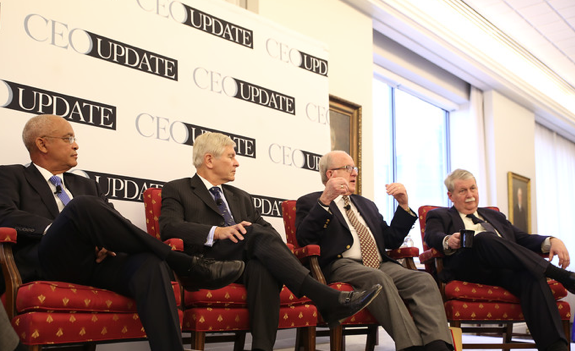CEO Update Live: Panelists say demands, risks driving CEO pay
CEO Update Live: Panelists say demands, risks driving CEO pay
- November 18, 2014 |
-
 WILLIAM EHART
WILLIAM EHART

Experts at CEO Update event say variable pay is growing in line with private sector, but boards are holding executives' ‘feet to the fire'
The increasing use of bonuses, the need for greater advocacy and rising demands on association CEOs are driving continued gains for association chief executive compensation, according to experts at the CEO Update Live: Executive Compensation Forum held Tuesday morning at the SunTrust Building in Washington, D.C.
Brian Vogel, senior principal with compensation consulting firm Quatt Associates, said pay is accelerating for association executives at all levels—especially among those already among the highest paid.
"Pay in general is going up across the board. It's not just the CEOs. That is accelerating," Vogel said.
Compensation had been going up at three percent a year since the recession, but among the top quartile of executives it is now rising 5 percent a year, he said.
The other three panelists were Jim Moss, founder and managing director of benefits firm PRM Consulting, Leonard Pfeiffer, managing director at executive recruitment firm Leonard Pfeiffer & Company and Jonathan Howe, president and senior partner at association law firm Howe & Hutton.
Moss said trends in the corporate world are being adopted by trade associations.
"Variable pay and bonuses continue to increase, more in alignment with private industry," he said.
Pfeiffer said pay is rising because risk for and demands on CEOs are also rising.
"Their feet are being held to the fire," he said. "There's a big argument going on about ‘Why are we spending all this money on the association?' They want more performance out of the CEO. A new executive will get a bonus plan and a salary at the same level or higher than the previous CEO."
Working against generous pay increases, especially at professional societies, is the fact that many board members don't think a CEO should earn more than they do.
Howe said it's important to convince such members that the CEO works in a different industry than they do, with different salary benchmarks in association management, especially in Washington, D.C.
‘A lawyer's best friend'
Howe advised CEOs to have professional help when negotiating their contracts—but from the right professional.
"If you write your own will, you're a lawyer's best friend," he said. "If you write your own contract, you're a lawyer's best friend," he said.
Vogel said executives need a representative who knows the association world. "Be cautious. You might have a lawyer or financial adviser who has no experience with the nonprofit sector and who doesn't understand the parameters. They are going to ask for things they can't get," he said.
Pfeiffer said bad representation by a lawyer can jeopardize the job opportunity.
"Make sure your lawyer understands that you really want the job," he said, and is not viewed as obstructionist.
Cash vs. perks
Howe said compensation is trending more toward cash, and away from perks.
"Perks are important but cash is even more important," he said. "Things are being driven more and more by cash."
He said executives should decide which perks they really want, and recognize the total cost to the association of their entire compensation package.
"What's important to you as a perk, and is the association or the society in a position to pay it?" Howe said. "What is the total cost of the package—salary, but what other costs are the association going to face as a result of hiring you or continuing you?"
 Compensation panelists, from left to right: Jim Moss, Leonard Pfeiffer, Jonathan Howe and Brian Vogel |
